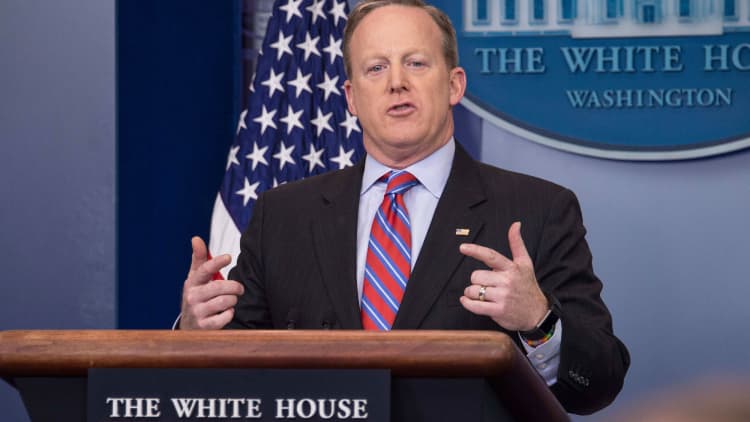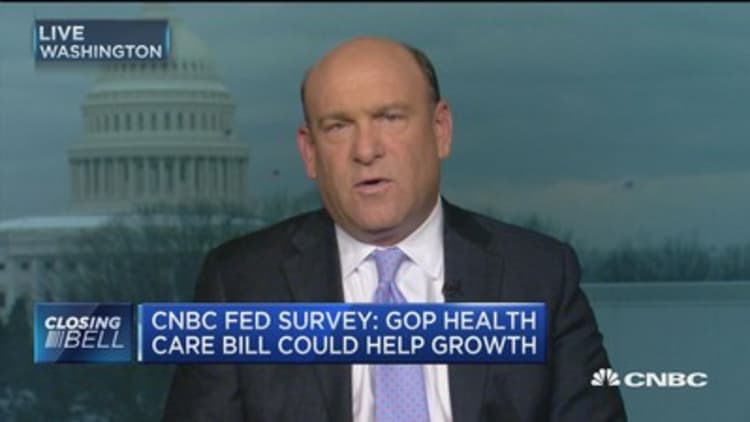People in the big Trump states could end up paying thousands more for insurance under their candidate's preferred health-care plan.
The top GOP bill to repeal and replace Obamacare would lead to people in states that voted heavily for President Donald Trump getting disproportionately less in the way of financial aid for their insurance plans than they now do under the Affordable Care Act.
Those states also would be likely to contribute more than their fair share to the 24 million additional people projected by the Congressional Budget Office to become uninsured by 2016 under the Republican proposal.
That outcome would be ironic, given the fact that many Trump voters currently enrolled in Obamacare have been critical of what they currently pay for insurance and have expressed hope that Trump would lower their coverage costs.
An analysis by the Center for Budget and Policy Priorities shows that the among the 39 states that use the federal Obamacare marketplace HealthCare.gov, the 10 states whose residents would lose the most in financial aid under Trumpcare all gave their electoral votes to Trump.
Leading those states is Alaska, where the difference between the average tax credit under Trumpcare would be $10,249 less than under Obamacare.
That is followed by North Carolina, where customers on Obamacare now would get an average tax credit that is $5,360 less under Trumpcare.
In South Dakota, which is 10th on the list, residents would get average tax credits that are $3,467 less than under Obamacare.
"Enrollees in 11 states would see their tax credits cut by more than half, and people in seven states — Alaska, North Carolina, Oklahoma, Alabama, Nebraska, Wyoming and West Virginia — would face average credit reductions of more than $4,000," the center's analysis said.
"These steep cuts would greatly reduce the affordability of coverage and almost certainly increase the number of uninsured in those states."
House Republican Health Plan, Compared to Affordable Care Act (ACA):
12 of the 15 hardest-hit states have significant rural populations
The GOP plan, as is the case currently with Obamacare, seeks to support the purchase of individual health plans with tax credits. However, the value of the Republican tax credits, unlike Obamacare, are tied to a customer's age, with older customers getting more than younger customers.
Those credits also would not adjust for income or for the cost of insurance plans. And the GOP plan allows older customers to be charged up to five times more in premiums for insurance than younger customers, as opposed to the 3-to-1 ratio allowed by Obamacare.
That means that people who are older, have lower incomes and live in states with high individual insurance plan costs would end up as a rule paying more for their coverage than under Obamacare, said Cynthia Cox, associate director of Health Reform and Private Insurance at the Kaiser Family Foundation.
And states with higher insurance plan prices, which tend to be more rural as well, disproportionately voted for Trump.
Cox told CNBC on Tuesday that in several Trump-leaning states, some Obamacare customers could see a loss in the value of their tax credits that would equal or surpass their annual income if the Republican bill becomes law.
"In Alaska, a 60-year-old couple making $40,000 per year would lose out on tax credits amounting to $45,000 per year," Cox said. "And that doesn't even account for the higher premiums under a 5 to 1 age band — so their net premium increase would almost certainly exceed their income."
"Similarly, a 60-year-old couple making $25,000 per year in" Arizona, Nebraska, North Carolina and Oklahoma "would lose out on premium tax credits amounting to $21,000 to $24,000 in 2020," Cox said.
"Adding to this the higher premiums under the 5 to 1 age band, it's very likely that older couples in these states would also have premium increases that equal or exceed their annual incomes."
Cox noted that the actual cost of health care would end up being even higher for many of those customers.
That's because the GOP bill not only would increase what they would pay in premiums, but also would repeal Obamacare's cost-sharing subsidies, which reduce what low-income individual plan customers pay out of pocket for health services.
Those out-of-pocket costs included deductibles, which must be paid by customers before their insurance covers the remaining cost of a medical service.
Cox noted that Kaiser Family Foundation has "done focus groups with Trump voters who are getting Obamacare coverage."
Trump supporters who buy that coverage through Obamacare exchanges, which is the only way they can get premium-reducing subsidies, "didn't like having to pay for their coverage," Cox said.
"Their main complaint was that their premiums were too high, or their deductibles were too high," she said.
And, "their premiums are going to go up even more, and their deductibles are going to go up even more under the Republican plan," Cox said.
Source: Center for Budget and Policy Priorities



